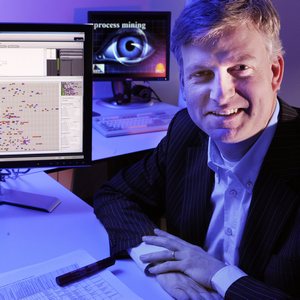PAIS Lab seminar: Process Cubes: Slicing, Dicing, Rolling Up and Drilling Down Event Data for Process Mining // Prof.dr.ir. Wil van der Aalst

October 28th, 18:30
HSE building at Kirpichnaya street, 33 - aud.902
Professor dr.ir. Wil van der Aalst (Technische Universiteit Eindhoven, PAIS Lab, Queensland University of Technology) presented the talk on subject "Process Cubes: Slicing, Dicing, Rolling Up and Drilling Down Event Data for Process Mining".
A b s t r a c t
Recent breakthroughs in process mining research make it possible to discover, analyze, and improve business processes based on event data. More and more events are recorded by a wide variety of systems ranging from embedded systems to enterprise information systems. The growth of event data provides many opportunities for process mining. However, current approaches cannot deal well with heterogeneous processes that change over time while emitting torrents of event data. Process mining is typically done for an isolated well-defined process in steady-state in an offline and centralized fashion. In his talk prof. Wil van der Aalst proposes the notion of process cubes where events and process models are organized using different dimensions. The idea is related to the well-known OLAP (Online Analytical Processing) data cubes and associated operations such as slice, dice, roll-up, and drill-down. However, there are also significant differences because of the process-related nature of event data. For example, process discovery based on events is incomparable to computing the average or sum over a set of values. Prof. Van der Aalst will also relate the process cube notion to distributed process mining techniques where event data are partitioned to improve performance and scalability.
A b o u t p r o f. V a n d e r A a l s t
Prof.dr.ir. Wil van der Aalst is a full professor of Information Systems at the Technische Universiteit Eindhoven (TU/e). He is also the Academic Supervisor of the International Laboratory of Process-Aware Information Systems of the National Research University, Higher School of Economics in Moscow. Moreover, since 2003 he has a part-time appointment at Queensland University of Technology (QUT). His research interests include workflow management, process mining, Petri nets, business process management, process modeling, and process analysis. Wil van der Aalst has published more than 160 journal papers, 17 books (as author or editor), 300 refereed conference/workshop publications, and 50 book chapters. Many of his papers are highly cited (he has an H-index of more than 104 according to Google Scholar, making him the European computer scientist with the highest H-index) and his ideas have influenced researchers, software developers, and standardization committees working on process support. He has been a co-chair of many conferences including the Business Process Management conference, the International Conference on Cooperative Information Systems, the International conference on the Application and Theory of Petri Nets, and the IEEE International Conference on Services Computing. He is also editor/member of the editorial board of several journals, including Computing, Distributed and Parallel Databases, Software and Systems Modeling, the International Journal of Business Process Integration and Management, the International Journal on Enterprise Modelling and Information Systems Architectures, Computers in Industry, Business & Information Systems Engineering, IEEE Transactions on Services Computing, Lecture Notes in Business Information Processing, and Transactions on Petri Nets and Other Models of Concurrency. In 2012, he received the degree of doctor honoris causa from Hasselt University. In 2013, he was appointed as Distinguished University Professor of TU/e and was awarded an honorary guest professorship at Tsinghua University. He is also a member of the Royal Holland Society of Sciences and Humanities (Koninklijke Hollandsche Maatschappij der Wetenschappen) and the Academy of Europe (Academia Europaea).
Slides: Slides 2013 11 03
Нашли опечатку?
Выделите её, нажмите Ctrl+Enter и отправьте нам уведомление. Спасибо за участие!
Сервис предназначен только для отправки сообщений об орфографических и пунктуационных ошибках.